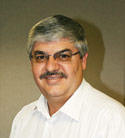May 2013
The other day someone close to me explained one of my questions with the remark that people, and especially producers, can handle hardship easier than good times – in other words poverty instead of wealth. That made me think deeply and made me view the society around me and all the social problems from a different perspective.
The first source I normally consult to find the truth concerning questions of this nature, is the Bible.
We are very innovative when enduring hardships. In business and on the farm we learn new methods to save, and surprisingly easier than before, we determine what is nice to have and what is absolutely indispensable.
However, as grain producers we are forever the optimists. Who else of sound mind, borrows millions of rands, deposits it in the ground and waits for rain out of God's hand as the only One who can make plants and crops grow?
In the north western part of our country this past summer season we experienced one of those "teachers" with a lesson for all producers who thought that we had nature tamed with all the technology and ingenuity available.
Sometimes it is a cruel awakening. Our hearts go out to those households and families who had to watch week after week how their crops were withering in the fields. In the grain industry, gathered over generations, there is a rich archive of stories about hope and solutions in bad times. It is quite delightful to listen to these stories!
Then there are also stories we do not wish to remember for a long time – stories of people such as the rich fool of the Bible. Mahatma Ghandi did not without reason list "wealth without work" as number one on his list of "people destroyers". Our society faces colossal social problems at all levels. The effect that money (too much or too little) has on our behaviour and conduct is just massive!
The impact of a few good seasons regarding good yields and high prices present a challenge confronting quite a number of producers. For many producers benefiting from the government's land reform and recapitalisation programme, there might just be a major test awaiting them.
Solomon did not without reason write that the one who amasses little by little over time is more enduring than the one who does it overnight. Make sure that your manner of doing and speaking does not change as your bank account increases or declines.

Jannie de Villiers, CEO
Publication: May 2013
Section: Editorial